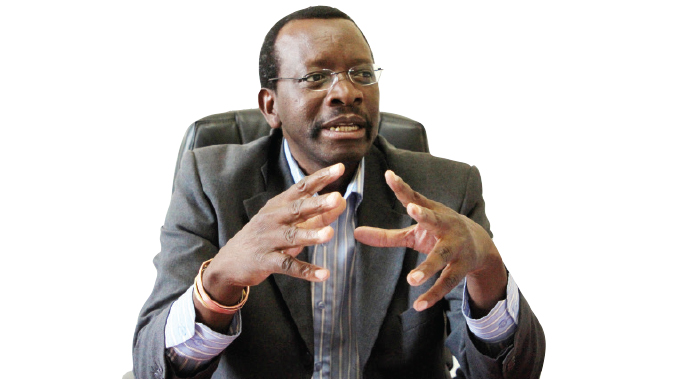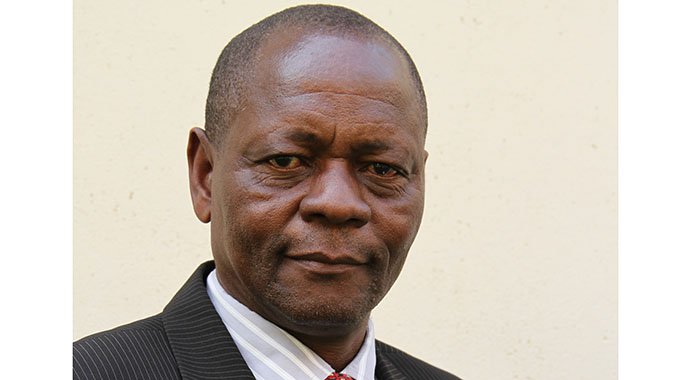Solwayo Ngwenya: From riding donkeys to Professor

Thandeka Moyo-Ndlovu
GROWING UP in the humble rural district of Lupane, Matabeleland North in the 1970s, it never occurred to Solwayo Ngwenya that one day he will be counted among high flying academics in the country and an expert in his field of choice.
He would carry out domestic duties associated with young people of his age that included but not limited to looking after the family herd. From the outside, there was nothing extraordinary about the young boy yet there was a burning zeal to achieve that was building from within.
His story is one of sacrifice where sweat and tears characterised much of his life journey.
He recalls how difficult things were then where a whole school grade would share a single textbook and their parents could not afford to cushion them either, they too, like their schools were divorced from opulence.
More than four decades of having burrowed his head in books, Ngwenya still has the steam to go on academically and is one of the few professors who were capped by President Mnangagwa during the National University of Science and Technology’s 27th graduation ceremony last Friday.
The renowned gynaecologist who also doubles up as Mpilo Central Hospital acting chief executive officer got a Doctor of Philosophy Degree in Statistics.
This was after he developed a model to help detect women in rural areas at risk of dying from severe preeclampsia.
The model ensures that they are referred earlier for treatment at central hospitals thereby preventing maternal deaths.
Preeclampsia is a pregnancy complication characterised by high blood pressure and signs of damage to another organ system, most often the liver and kidneys.
It usually begins after 20 weeks of pregnancy in women whose blood pressure had been normal.
Prof Ngwenya’s model will soon be developed into a mobile app to save the lives of pregnant women.
From fighting pythons to facing storms while protecting his father’s donkeys, he knew from day one that he had to work extra hard to uplift the family’s name.
Born as a last-born child to his 46-year-old mother years ago at St Lukes Hospital in Lupane district, he was convinced that his destiny was going to be that of herding his father’s cattle, goats, donkeys.
His aged father who had 21 children then was a hunter and gatherer who for the longest of time had sustained his big family also through peasant farming.
He vividly remembers the morning of Tuesday January 28 in 1976 when he first set foot into a school where they had lessons under a tree.
The barefooted tall and skinny boy had come to fulfill his father’s wish: “My son I want you to go to school and study hard”- a parent’s plea which offset the 45 years he spent studying until he became a professor.
By the age of 11, he was a lone herd boy and at one time managed to kill a python by himself, an incident which he says remains a highlight of his days as a herd boy in Silobela village.
The war was raging then and in 1977, his school was burnt down during the war and it temporarily brought to a halt his much-loved studies.
“Indeed, schools reopened in the middle of 1980 and I was meant to go back to Grade Two but they said we could no longer continue. We eventually bulldozed our way to school where we met my teacher Mr Lovemore Ncube who would teach us from under a tree,” he said.
“Surprisingly that tree which was a ‘classroom’ still stands at Zinapi Primary school where I studied until Grade Three. We eventually moved to Bulawayo and that is how I managed to complete my studies at Magwegwe Primary School.”
He aced his Grade Seven exams and moved in with an elder brother who was working in Gweru, Midlands province who got him a place at Thornhill High School.
Prof Ngwenya managed to get a place at the University of Zimbabwe in Harare where he studied medicine for five years before returning to Bulawayo for his housemanship.
“I did my housemanship at Mpilo and UBH and afterwards stayed at Mpilo as a hospital medical officer. After that I had a dream of going to the UK to further my studies but could not afford the plane ticket.
I was earning about $4 000 but needed $25 000 for the ticket. The hard-working herdboy remembered that I had to fight with my all to get to where I wanted to,” said Prof Ngwenya.

Professor Solwayo Ngwenya
“I managed to buy a kombi on a loan scheme and hired a driver and tout as I was a junior doctor working most weekdays.
During weekends I would drive the kombi plying City-Nkulumane route just to save for the ticket and mind you, fares were $3 a person which meant pushing hard to reach the targeted $25 000,” he said.
“I flew to London Gatwick Airport using AirZim in my first ever flight in a Jumbo Jet Boeing travelling at 1000km/hour compared to the donkey rides I was used to back home in Lupane.
This was a huge milestone for a herd boy and that is how I found myself working for eight months with no pay just for references so that I could go and specialise.”
Of all his achievements, being admitted into the Royal College of Obstetricians and Gynaecologists in the UK was a risk he is proud to have taken.
“After three years I became a member and I graduated after putting in a lot of hard work, tears and sacrifices. I then decided to come back home in 2006, at the heart of disaster and suffering as I knew that most of my great achievements would be here on my ancestral ground and not in Europe,” he said.
His passion for women drove him to build a hospital from scratch where he had helped hundreds of women deliver since its inception in 2011.
The Royal Women’s Hospital in Hillside suburb has wards which Prof Ngwenya named after his grandparents and parents who played an important role in nurturing him.
Some of the wards were also named after close friends who played a part in his journey.
“It has surely been a from grass to grace journey for me, I honestly never thought I would come this far but am grateful to God and my ancestors for leading me all the way.”
Professor Ngwenya finds joy in simple things and is now a father of seven children and he hopes to have at least 10 before he dies. This, he proudly says will be in memory of his late parents who had many children. –@thamamoe.












Comments